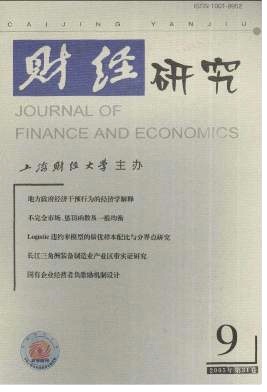国有企业经营者负激励机制设计——“油锅合同”模型解析
财经研究 2005 年 第 31 卷第 09 期, 页码:116 - 125
摘要
参考文献
摘要
文章基于心理学和委托代理理论,探讨了国有企业经营者激励现状,认为国有企业存在显性激励不足、隐性激励有余和负激励缺乏等问题。国有企业经营者显性激励不足导致其动力缺乏,而负激励缺失更导致经营者偷懒和机会主义行为。负激励的极端——“油锅合同”能够对经营者形成一种威慑,杜绝或防止经营者的道德风险,促使经营者努力工作。
[1]Tversky, A, Kahneman, D. Advances in prospect theory: Cumulative representation of uncertainty[J]. Journal of Risk and Uncertainty, 1992, (5):297-323.
[2]Adolph Berle ,Gardiner Means. The modern corporation and private property[J]. New York, 1932:355-356.
[3]张维迎.企业的企业家——契约理论[M].上海:上海人民出版社、上海三联书店, 1995,14.
[4]Hart,O.Firms,contracts and financial structure[J].Oxford University Press,1995.
[5]刘小玄.现代企业的激励机制:剩余支配权[J].经济研究,1996,(5):3.
[6]刘正周.管理激励[M].上海:上海财经大学出版社,1998.
[7]杨彩萍.论国有企业经营者的显性激励[J].无锡商业职业技术学院学报,2001,(1):26 -28
[8]Fama,E. Agency problems and the theory of the firm[J]. Journal of Political Economy, 1980,(88):288-307.
[9] Holmstrom,B. Moral hazard in team[J]. Bell Journal of Economics, 1982, (13):324-340.
[10]D. Sappington,incentives in principal-agent relationships[J]. Journal of Economic Perspectives, 1991,5(2):45-66.
[11] Garen, John. Executive compensation and principalagent theory[J]. Joural of political Economy,1994,(10):2-6.
[12]邵建平,曹凌燕.威胁激励的理论与应用研究[J].管理探索,2003,(3):42-45.
[13]黄德林等.对公务员实施“负激励”中存在的问题及其对策[J].中国行政管理,2004, (3):18.
[14]黄群慧.控制权作为企业家的激励因素:理论分析及现实解释意义[J].经济研究, 2000,(1):41-47.
[15]吕剑龙.结构安排与治理效率——关于国企改革中企业所有权问题的思考[J].兰州 大学学报,2002,(2):118-123.
[16] Jensen,M C,and Murphy,K J. Performance pay and top-management incentives[J]. Journal of Political Economy, 1990,98(2):225-264.
[17]张维迎.博弈论与信息经济学[M].上海:上海人民出版社、上海三联书店,1996,408 -409.
[18]郑江淮.企业家行为的制度分析[M].北京:人民出版社,2004,31-38.
[19]中国企业家调查系统.中国企业家成长与发展报告(上)——1993-2003调查报告 专辑[M].北京:经济科学出版社,2003,56.
[20]国有企业改制法律法规编辑委员会.国有企业改制法律法规新编[M].北京:中国水 利水电出版社、知识产权出版社,2005,394-400.
[21] Hart,O,and Moore,J. Property rights and the nature of the rirm[J]. Journal of Political Economy, 1990, 98:1119-1158.
[2]Adolph Berle ,Gardiner Means. The modern corporation and private property[J]. New York, 1932:355-356.
[3]张维迎.企业的企业家——契约理论[M].上海:上海人民出版社、上海三联书店, 1995,14.
[4]Hart,O.Firms,contracts and financial structure[J].Oxford University Press,1995.
[5]刘小玄.现代企业的激励机制:剩余支配权[J].经济研究,1996,(5):3.
[6]刘正周.管理激励[M].上海:上海财经大学出版社,1998.
[7]杨彩萍.论国有企业经营者的显性激励[J].无锡商业职业技术学院学报,2001,(1):26 -28
[8]Fama,E. Agency problems and the theory of the firm[J]. Journal of Political Economy, 1980,(88):288-307.
[9] Holmstrom,B. Moral hazard in team[J]. Bell Journal of Economics, 1982, (13):324-340.
[10]D. Sappington,incentives in principal-agent relationships[J]. Journal of Economic Perspectives, 1991,5(2):45-66.
[11] Garen, John. Executive compensation and principalagent theory[J]. Joural of political Economy,1994,(10):2-6.
[12]邵建平,曹凌燕.威胁激励的理论与应用研究[J].管理探索,2003,(3):42-45.
[13]黄德林等.对公务员实施“负激励”中存在的问题及其对策[J].中国行政管理,2004, (3):18.
[14]黄群慧.控制权作为企业家的激励因素:理论分析及现实解释意义[J].经济研究, 2000,(1):41-47.
[15]吕剑龙.结构安排与治理效率——关于国企改革中企业所有权问题的思考[J].兰州 大学学报,2002,(2):118-123.
[16] Jensen,M C,and Murphy,K J. Performance pay and top-management incentives[J]. Journal of Political Economy, 1990,98(2):225-264.
[17]张维迎.博弈论与信息经济学[M].上海:上海人民出版社、上海三联书店,1996,408 -409.
[18]郑江淮.企业家行为的制度分析[M].北京:人民出版社,2004,31-38.
[19]中国企业家调查系统.中国企业家成长与发展报告(上)——1993-2003调查报告 专辑[M].北京:经济科学出版社,2003,56.
[20]国有企业改制法律法规编辑委员会.国有企业改制法律法规新编[M].北京:中国水 利水电出版社、知识产权出版社,2005,394-400.
[21] Hart,O,and Moore,J. Property rights and the nature of the rirm[J]. Journal of Political Economy, 1990, 98:1119-1158.
引用本文
杨善林, 王素凤, 李敏. 国有企业经营者负激励机制设计——“油锅合同”模型解析[J]. 财经研究, 2005, 31(9): 116–125.
导出参考文献,格式为:





 8124
8124  4606
4606

